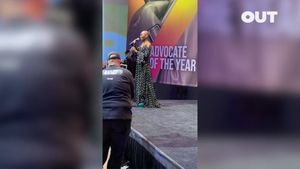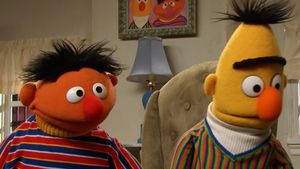Looking at modern
desire through the eyes of history, literature and myth is a
recurring theme in Daniel Mendelsohn's books, including his
family memoir
The Lost: The Story of Six of the Six Million
, and his literary criticism. So it's little wonder to discover
he's been working on a major new translation,
C.P. Cavafy: The Collected Poems
and
The Unpublished Poems
for the last ten years. Cavafy (1864 -1933), one of the most
renowned modern Greek poets of the 20th century, lived most of
his life in Alexandria, Egypt. A journalist and civil servant,
he was also a gay man deeply in touch with his desires though
not always at ease with them. While Cavafy's poem
"Ithaca" has become a staple of LGBT anthologies and
lit courses, many of his other historical poems, with their
references to figures in Greek antiquity that are unfamiliar
even to classicists, have more often fallen by the wayside. But
Cavafy has found a powerful champion in Mendelsohn, whose
sensitive translations and accompanying commentary make this
important poet's haunting meditations on Eros, memory, time and
antiquity significantly more accessible and rewarding.
What do you love most about Cavafy?
He's an erotic realist.
He sees love through the eyes of the historian. Usually, it's
already over and done with by time he starts writing about it.
He goes to the uncomfortable places -- to desire when it's
gone, to desire when you're too old to be desired back. They
may not be prettiest places, but they're important.
He's not embarrassed about it, he's forthright. The
margins, the shady areas, the out of the way places and people
-- these are his themes.
He's also a historian who brings a new context to gay
lives in antiquity.
What Cavafy gives gay
readers is a deep sense of one's position within a group of
people with a history, and within the sweep of History. He's
shows that there have always been cute boys who dissed you,
that people always grew old and stopped being the most
beautiful ones on the block. We get so embroiled in the
day-to-day, we often miss the deepest history. But this history
is crucial for gay people, because they are so often told they
don't have a history. Cavafy's always saying that this
has all happened before -- and every time it happens, it's
thrilling, heartbreaking, and wonderful.
We take it for granted that Greek antiquity was a haven
for homosexuality. But how does Cavafy play with that
idea?
Classical Greek
antiquity was a time when men and boys had erotic relationships
with impunity, and it makes sense that people would idealize it
as a moment of safety, even though the actual historical
picture was more complicated and weird. But Cavafy has no
interest in that era at all. He likes the Hellenistic period,
around the third and fourth century AD, when that safety was
disappearing and homosexuality was becoming problematized. He's
looking at the survival of Greek love as Christianity is
rising.
How would you describe Cavafy's position in the
literary canon?
He's in a canon of gay
writers, but the average college graduate isn't likely to
have a lot of Cavafy under his belt. Part of the problem of
Cavafy is that his interest in the margins and out of the way
places puts him in danger of placing himself out of the canon.
He's a contemporary of T.S. Eliot's, and his themes are
very much those of 20th century poets: time, memory, cultural
appropriation. Yet he's from Alexandria, this weird, rich
backwater that's no longer politically important. This might be
the final irony of Cavafy's career: He's a major 20th
Century poet, smiling at you from the margins of the 20th
Century.
Yet his emotional immediacy and world-weariness also make
him seem way ahead of his time.
This is an incredibly
interesting moment to read his wry, sardonic take on passing of
world orders, the disintegration of empire, the inevitable end
of the political status quo. All of these are themes of our
historical moment.
In a gay context, Cavafy was writing slightly after Oscar
Wilde and contemporaneously with Marcel Proust. He was first
brought to the English speaking world by E.M. Forster and was
also championed by W.H. Auden before you. What do you make of
this chain of creative midwifery?
This midwifery isn't
exclusive to gay artists. It's what artists do in general. But
for minorities -- who are exactly the kind of people that
Cavafy was interested in -- it's particularly important to keep
the memory of certain poets current. Mass culture favors the
obvious, the pat, the reassuring. Yet to have this tart person
saying sardonic, true little things is something you want to
make sure doesn't get lost.
What challenges did translating Cavafy pose for you?
The deeper into it I
got, the more I realized what was needed was not just a new
translation, but a full commentary for intelligent,
non-specialist readers who want to know what Cavafy is about. A
friend who is an eminent classicist told me, "we can't
understand these poems unless we understand some important
ironies that just disappear if you don't know the
historical specifics." I was also able to bring out the
meter, assonance, rhyme that people didn't think was there
because it wasn't in the previous translations. That was so
exciting for me. In previous attempts to present Cavafy as an
accessible poet, the poems have been flattened. But his poems
are haunted by languages, history, complications. I'm just
trying to help polish the dazzle.
How did immersing yourself in Cavafy affect your own
work?
I was working on Cavafy
the whole time I was working on my book
The Lost,
and he deeply influenced how I related to my material. He
writes about the little people who get crushed by the great
forces of history. For example, he has a poem set in 31 BC in
Alexandria -- a poem about a perfume peddler who comes into the
square on the day of the defeat of Mark Anthony and Cleopatra
is announced, but he doesn't know what's going on. I
didn't realize it at the time, but as I look back now, it
seems obvious that that sensibility really influenced my
thinking about how the big events of history affect the little
guy, the people we don't remember -- in that case, six
members of my family during the Holocaust.
Why do you think there have been so many enduring gay
poets through the centuries -- from Sappho to Walt Whitman to
Rimbaud to Cavafy, to name just a few? Is there something
about queerness that makes for good poetry, or something
about poetry that's ideal for expressing queer themes?
The self-positioning of
any serious artist is at an angle to everyday experience, and
that is a priori the self-positioning of all gay people and
minorities. So we have a strong attraction to artistic
projects. For comparison, let's think of the nationalities that
famously throw off great poets-like the Irish and the Greeks.
Maybe there's something about having a boot on your neck for
most of history that produces the marginality and anguish that
combine to create an extreme poetic sensibility. Irish and
Greek poets are part of a colony, yet they also have a sense of
patriotism -- a sense that what they are beautiful and noble,
despite their oppression. So translate that into homosexuality
and there's your answer: everyone's telling gay people there's
something wrong with them, yet we know it's beautiful and true.
There's the truth of what you feel versus the precedent of
people who don't like you. So then you have to say what you
think is beautiful, but you can't say it in an obvious way.
That makes for great poetry.
















































































